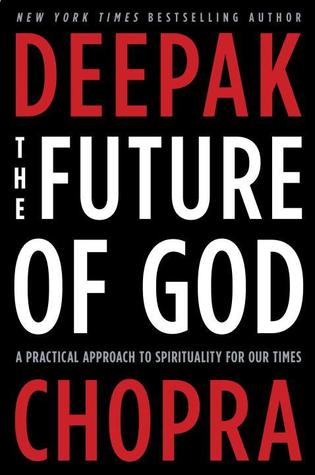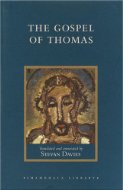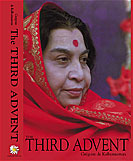![]()
Why God has a Future

"When it comes to God, almost all of us, believers and non-believers alike, suffer from a kind of nearsightedness. We see-and hence believe-only what's right in front of us. The faithful see God as a benign parental figure bestowing grace and justice as he judges our actions here down below. The rest of us think God is far more distant, impersonal, and uninvolved. Yet God may be closer and more involved than that, closer than breathing, in fact.
At any given moment, someone in the world is amazed to find that the God experience is real. Wonder and certainty still dawn. I keep at hand a passage from Thoreau's Walden about this, where he speaks of 'the solitary hired man on a farm in the outskirts of Concord, who has had his second birth.' Like us, Thoreau wonders if someone's testimony about having a 'peculiar religious experience' is valid. In answer, he looks across the span of centuries:
Zoroaster, thousands of years ago, travelled the same road and had the same experience, but he, being wise, knew it to be universal.
If you find yourself suddenly infused with an experience you cannot explain, Thoreau says, just be aware that you are not alone. Your awakening is woven into the great tradition. Humbly commune with Zoroaster then, and, through the liberalizing influence of all the worthies, with Jesus Christ himself, let 'our church' go by the board.
In contemporary language, Thoreau is advising us to trust our deepest belief that spiritual experience is real. Skeptics turn this advice on its head. The fact that God has been experienced over the ages only goes to show that religion is a primitive holdover, a mental relic that we should train our brains to reject. To a skeptic, God persisted in the past because priests had the power to enforce faith, allowing no deviation among their followers. But all attempts to clarify matters-to say, once and for all, that God is absolutely real or absolutely unreal-continue to fail. The muddle persists, and we all have felt the impact of confusion and doubt....
In all of us there are seeds of unbelief, because we were born in a secular age that questions everything mystical. Better to be free and skeptical than bound by myths, superstition, and dogma. When you touch the skeptic inside you, unbelief is a reasonable state to be in. But for most people it's also an unhappy state. They feel unfulfilled in a totally secular world where the deepest worship, arguably, goes to sports heroes, comic books, and having a perfect body. Science gives us no assurance that life has meaning when it describes the universe as a cold void ruled by random chance.
And so faith persists. We want the universe to be our home. We want to feel connected to creation. Above all, we don't want freedom if it means enduring perpetual anxiety and insecurity, a freedom that has lost its moorings to the meaning of life. So whether you call it clinging to faith or abiding by the traditions of our forefathers, religious belief exists everywhere. For billions of human beings there is no livable alternative.
But what about the third stage, after unbelief and faith-certain knowledge of God-which is the rarest and most elusive? To be truly certain, a person may have to undergo a transformative experience or miraculously retain the innocent soul of a young child. Neither is all that realistic in most lives. People who return from near-death experiences, which are extremely rare to begin with, have no hard evidence about 'going into the light' that would convince a skeptic. What has changed for them is private, internal, and subjective....
Yet God is hidden somewhere, as a shadow presence, in all three situations, where as a negative (the deity you are fleeing when you walk away from organized religion) or as a positive (a higher reality that you aspire to). Being faintly present isn't the same thing as being truly important, much less the most important thing in existence. If it is possible to make God real again, I think everyone would agree to try.
This book proposes that you can move from unbelief to faith and then to true knowledge. Each is an evolutionary stage, and by exploring the first, you find that the next one opens. Evolution is voluntary when it applies to the inner world. There is complete freedom of choice. Once you know unbelief in every detail, you can remain there or move on to faith. Once you explore faith, you can do the same, accepting it as your spiritual home or looking beyond. At the end of the journey lies knowledge of God, which is just as viable-and much more real-than the first two stages. To know God isn't mystical, any more than knowing that the Earth moves around the Sun. In both cases, a fact is established, and all previous doubts and errant beliefs naturally fall away.”
The Future of God: A Practical Approach to Spirituality for Our Times
Deepak Chopra, Harmony 2014, pp. 7-11
A New Version, God 2.0
"Every age creates a God that serves only for a while (although that while can be centuries). Our age makes the most minimal demand on spirit: We want a deity that we can freely ignore.
How, then, should we re-create God? I'm speaking of God in the West. Other varieties of God are not ready for renewal. Fundamentalist Islam is a rearguard action that is desperately trying to preserve God 1.0, insisting on the most primitive version, a God who protects the faithful from annihilation; such a God cannot help but be a matter of life and death. Nor am I speaking of God in the East, which has a long tradition of seeing God as One. That's God 1.0 in the seventh stage, a presence that imbibes all of creation. Such a deity has no location except at the source of our consciousness, which can only be found after an inner journey. God as the ultimate self is the ultimate revelation. Countless people in Asia are brought up to believe in the higher self—in India it is called Atman—but they don't actually undertake the inner journey. As in the West, most people in the East live as if God were optional, a fixture of their cultural heritage that makes little or no difference in how their practical life turns out.
In order to have a future, God must fulfill the promise made in his name throughout history. Instead of being a projection, God 2.0 is the reverse. He is a reality from which existence springs. As you journey inward, everyday life become suffused with divine qualities like love, forgiveness, and compassion. These are experienced in yourself as a reality. God 2.0 does much more—he is the interface between you and infinite consciousness. As things are now, a God experience is rare, barely hinted at, because our focus is on the outer world and material goals. When you begin the process of finding God, the inner world reveals itself. God experience will start to become the norm, not in a spectacular way like a wished-for miracle but in the far deeper way of transformation.”
The Future of God: A Practical Approach to Spirituality for Our Times
Deepak Chopra, Harmony 2014, pp. 117-18

"There may be very little time left to take the adventure into total being that the Gospel of Thomas advocates with such astringent brilliance and precision. In such a terrible age as ours, it is easy to believe that the dark powers, the powers of that corpse of the world that the Jesus of Thomas so fiercely denounces, have won already, and there is nothing even the most passionate of us can do to turn around a humanity addicted to violence and destruction.
Despair, however, is the last illusion. The Gospel of Thomas and the Jesus who gave it to us continue to challenge us to dare to become one with the Divine and start living the revolutionary life that streams from union and that can transform all things. This worst of times needs the clearest and most unflinchingly exigent of visions to counteract and transform it; in Jesus' words in the Gospel of Thomas and in his living out of their reality through and beyond death itself into the eternal empowering glory of the Resurrection, we have the permanent sign of the Way, the Truth, and the all-transforming life that, even now, can build here on earth the reality of God's Kingdom.”
S. L. Davies, The Gospel of Thomas
Shambhala Library, Dec 2004, p. 26

Shri Mataji Nirmala Devi “So the time has come for all of us to understand that all religions are One. They are part and parcel of One God and that all Incarnations are supporting each other, nourishing each other and caring for each other. There is complete concord between them. There is no way you will see they will oppose each other. Never!"
The Paraclete Shri Mataji Delhi, India—February 3,1983
"Sahaja Yoga is more concerned with the Mahalakshmi Power—evolutionary power- which also integrates all the three powers at the point beyond the Brahmarandra. With this integration, the Sahaja Yoga discovery proves that the human being is a perfected instrument, a computer built in various period which, when put to the mains, starts giving information.
It proves that all religions are living flowers on the tree of life and they describe the Truth. All Incarnations are true. All this can be proven at the time of Kundalini awakening. It creates a human awareness, which can have a dialogue with the Unconscious.”
The Paraclete Shri Mataji London, UK—October 12, 1976
"If one considers the absurdity and the implications and the after-effects of many otherwise apparently rational conclusions, one has to say that rationality, though we are very proud and boast of it, it is not such a responsible vehicle for wisdom. In view of the unreliable results of applied rationality, it is clearly wrong to have such firm ideas and beliefs based solely on rational theories. There is no final answer to fundamental questions through the use of rationality alone, because discussion shows that each view might be partially right. One definitely cannot say that this one is fully right and the other is fully wrong. In our wisdom, we must understand that the Truth in effect is absolute and not relative or variable as we commonly experience it, like the six blind men (a Jew, Christian, Muslim, Sikh, Buddhist and Hindu) describing an elephant from six different angles: one, holding the trunk, says: "It is long like a snake.”; another, feeling a leg, says: "It is massive like a tree.”Each has a very firm and indeed justified faith in the correctness of what he has found, but each contradicts the other, because each has only a partial and relative view.
Of course, rationality is not even as firmly anchored in Reality as the blind man's perception and who may not even be in contact with the elephant, but perhaps indeed the trunk of a tree, a piece of hanging rope, or a poisonous snake. Unless you have access to the Absolute Truth, which is a totality, unless you can see the whole elephant, how can you decide whether your view is the right one?”
The Paraclete Shri Mataji
Disclaimer: Our material may be copied, printed and distributed by referring to this site. This site also contains copyrighted material the use of which has not always been specifically authorized by the copyright owner. We are making such material available to our readers under the education and research provisions of "fair use" in an effort to advance freedom of inquiry for a better understanding of religious, spiritual and inter-faith issues. The material on this site is distributed without profit. If you wish to use copyrighted material for purposes other than “fair use” you must request permission from the copyright owner.